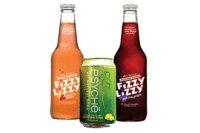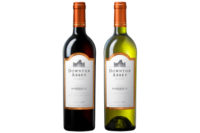White Rock
By SARAH THEODORE
A classic brand becomes a specialty player
When White Rock Products Corp., Whitestone, N.Y., got into organic beverages last year, it was the latest in a long history — 135 years long, as a matter of fact — of evolutionary changes the company has undertaken. Established in 1871, the family-owned company has continuously found ways to adapt to changes in the industry and shifts in consumer preferences, from general market products during the last century to high-end specialty products in this one.
“What we’re doing is evolving from a mass
market company into a specialty, niche company,” says White Rock
President Larry Bodkin.
White Rock began as a sparkling water company in
Waukesha, Wis., and got into drink mixers in the 1940s and ‘50s.
During the ‘70s, the company developed flavored soft drinks. When it
came to deciding which products to focus on these days, Bodkin says,
“It’s almost like we had to pick which lineage to follow. We
decided that we’re basically water and mixers in terms of
heritage.”
The sparkling organic soft drink seemed to fit both
the company’s new direction and its established history. The company
developed the organic line to be healthier than traditional soft drinks,
with one-third fewer calories and a third less carbonation. The product
carries the USDA Organic logo and is available in Red Peach, Raspberry
Creme and Passion Orange flavors. “It’s a light, refreshing
beverage, and we’re selling primarily through the natural and organic
channel,” Bodkin says.
The White Rock logo, a woman looking at her reflection
in the water, lends itself to a healthier product line-up, he adds.
“She’s a symbol of purity, so we feel like our logo is a good
fit for an organic product.”
Developing an organic product was no easy feat,
according to Bodkin. “It’s very difficult to make an organic
beverage,” he says. “We had to have 95 percent of the
ingredients certified by Quality Assurance International. And you have to
make it taste good and look good. There was a lot of lab testing and a lot
of back and forth ... but once we got it, we got it.”
In addition to the organic line, White Rock produces
Olde Brooklyn premium gourmet sodas, depicting the Brooklyn Bridge on its
packaging and Brooklyn neighborhoods in product names such as Williamsburg
Root Beer, Coney Island Cream Soda, Brighton Beach Black Cherry, Flatbush
Orange Soda, and Bay Ridge Birch Beer. White Rock Seltzers are available in
flavors such as Raspberry, Black Cherry and Mandarin Orange, and its mixers
include Club Soda, Ginger Ale and Tonic Water in regular and diet versions.
Another unique product, available mainly in the
Midwest, is Sioux City soft drinks. “It’s a Western-themed soft
drink line that my uncle created in the mid-‘80s,” Bodkin says.
“It’s a unique product and it fits with our mission of trying
to sell more high-end cases.”
Sioux City Sarsaparilla, a flavor described as a cross
between root beer and cream soda, is the leading seller in the line, which
also includes Root Beer, Cream Soda, Black Cherry, Birch Beer and Orange
Cream.
Competing with the big guys
Until the early 1990s, White Rock owned its own
manufacturing plants and distribution routes,
but sold those operations in the early 1990s. Today, White Rock works with
several co-packers that give it access to markets throughout the country.
Most of its distribution is located east of the Rockies, Bodkin says, and
the company operates sales offices in New York, Chicago, Texas and Florida.
When developing new brands, Bodkin says the company
looks to its distributors and retailers for feedback on ideas.
“I think when you’re a small company like
us you have to engage in guerrilla warfare,” he says. “You just
try to learn as much as you can. All of us are out in the stores all the
time, and we’re experimenting with things.”
This spring, the company produced a
kosher-for-Passover tea, and, “It went quite well,” Bodkin
says. “We sold out our whole production run and some of the retailers
came back to us and said they wanted it all year long.”
It also is looking into a holiday pack for its mixers
that would include six 1-liter bottles of Club Soda, Tonic Water and Ginger
Ale. “Because we’re small, we can tweak things and try
things,” Bodkin says.
Bodkin also believes the company’s history gives
it an edge with consumers. “It’s a well-known brand, and
it’s respected, not only in New York, but almost everywhere people
have heard of it,” he says. “People can imitate our products
but they can’t imitate our heritage.”
The biggest challenge, he sees, is continuing to
differentiate White Rock in a marketplace with an ever-increasing number of
products. “To do something that’s unique and that will stand
out in the crowd is probably everybody’s biggest challenge,” he
says.
For now, White Rock is focusing on getting consumers
used to the idea of an organic soft drink. “We’re trying to
convince people, one consumer at a time,” Bodkin says.
“We’re doing a lot of demos, a lot of coupons ... Soda
isn’t considered healthy, but really, there’s nothing wrong
with carbonated soft drinks. It’s just the
perception. We’re trying to prove that you can make a healthier
soda.” BI
Did you know?
The White Rock brand has had its share of celebrity
sightings throughout its history. According to the company...
The brand was featured at the coronation of
England’s King Edward VII.
White Rock water was used at the christening of
Gloria Vanderbilt.
Charles Lindbergh launched his historic flight from
New York to Paris by breaking a bottle of White Rock Sparkling Water
over the Spirit of Saint Louis plane.
White Rock began using
its logo, “Psyche,” in 1893 based on a painting titled
“Psyche at Nature’s Mirror,” featured at the Chicago
World’s Fair, by German artist Paul Thumann.
The White Rock logo once was listed as one of the Top
10 trademarks in the United States.
New York’s Times Square once featured a clock
with the slogan “White Rock-The Water For All Time.”


